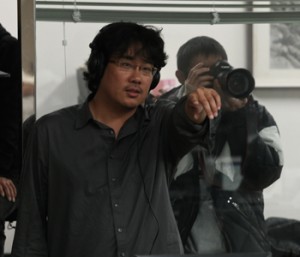 The gripping films of Korean enfant terrible Bong Joon-ho (b. 1969) offer engaging and intense reinventions of popular genres. His four feature films are animated by a flair for dramatic cinematic storytelling and sharp yet subtle commentary on the historical and political complexities of present-day Korean society.
The gripping films of Korean enfant terrible Bong Joon-ho (b. 1969) offer engaging and intense reinventions of popular genres. His four feature films are animated by a flair for dramatic cinematic storytelling and sharp yet subtle commentary on the historical and political complexities of present-day Korean society.
Bong’s singular talent lies in his ability to interweave multiple narrative strands, a wide range of memorable characters, and a dramatic spectrum of moods, from elegiac to terrifying to charming. Bong’s dark crime stories offer him the broadest range to fully sound the depths of his open-ended characters – and, by extension, the Korean nation. Ultimately, his work presents a cynical view of human nature, with the bonds of family, community and friendship constantly broken by cruelty, apathy and hypocrisy. Bong’s seemingly straightforward narratives are shadowed by strange enigmas, not so much over what is happening but in what the events ultimately mean. One is never certain whether his characters should be understood as heroic, tragic, grotesque or comic, an unsettling ambiguity that lends Bong’s films their haunting emotional depths. (Harvard Film Archive)
After completing only three feature films, writer and director Bong Joon-ho’s undeniable talent pushed him to the forefront of the Korean film industry. Barking Dogs Never Bite (2000), part black comedy and part social satire, indicated the arrival of a unique sensibility. Memories of Murder (2003) was a gripping thriller about a series of unsolved murders in the 1980s. The Host (2006) followed a family as they dealt with a monster that rose from the Han River in the middle of Seoul.
The films of Bong Joon-ho regularly, and brilliantly, break with convention, thanks to an imagination that is not confined to the accepted parameters of humor, suspense, or horror. Bong Joon-ho remains a director of intimacy even as he puts himself in the public eye, and despite holding the Korean box office admissions record (with 13 million ticket sales for The Host), he chose to examine the simple figure of the mother for his latest film. Mother (2009) dissolves Korean social realism and family drama in a vat of larger-than-life imagination. Bong turns his camera on a figure well known to all, once again exploring it through unexpected cinematic aspects.